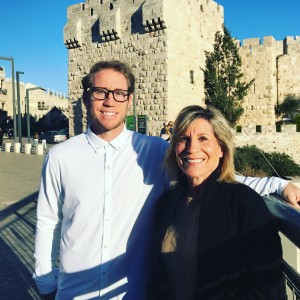
Ty Kelly and his mother, Diane, who is Jewish, traveled to Israel in January 2017 with a group of Jewish-American ballplayers
By Ron Kaplan, correspondent
“Slide, Kelly, Slide!” was usually heard in association with the great 19th-century player King Kelly, who played for several Major League teams and was voted into the Baseball Hall of Fame in 1945.
But fans of the Israeli team that will be participating for the first time in the upcoming World Baseball Classic hope to shout it out for perhaps the most unlikely-sounding member of the roster: Tyler Patrick “Ty” Kelly.
The 28-year-old outfielder, who made his MLB debut last May with the New York Mets, will represent Israel in the upcoming WBC in Seoul, South Korea, beginning March 6.
Kelly spoke with Jewish Baseball News while driving to his parents’ home in Northern California prior to reporting to the Mets’ spring training camp in Port St. Lucie, Florida. Just hours after the February 9 conversation, the Mets designated him for assignment. He will begin the 2017 season with the club’s Triple-A affiliate in Las Vegas.
The first question that comes to mind when hearing that a player named Kelly wound up on Team Israel is, how on earth did this happen?
“Well, there are two sides to every story,” he said. “And there are two sides to my name, I guess. My dad’s side of the family is Catholic, and my mom’s side…is Jewish, so I got the privilege of experiencing two religions growing up.” Kelly said his family didn’t attend church or synagogue much. “When my mom’s side of the family was over, we were learning about the basic Jewish stuff… and when my dad’s side was over it was all about Christianity and everything. It was a good mix of both.”
Kelly’s first taste of international competition began with an e-mail from Peter Kurz, president of the Israel Association of Baseball. Kurz had heard the Stockton, CA, native might have Jewish roots, so asked if Kelly had at least one Jewish grandparent, which would qualify him to join Team Israel. In fact, Kelly’s mother, Diane, is Jewish, so he was in.
“I really had no idea how the World Baseball Classic worked,” said Kelly, who made his Major League debut on May 24 and ultimately appeared in 39 games for the Mets in 2016, finishing with one home run, seven RBIs, and a slash line of .241/.352/.345. “But [Kurz] said I was eligible, and he asked if I wanted to play. It’s an amazing opportunity, and it’s really cool that so many different guys can play on different teams.” Kelly had never even considered playing for Team Israel. “I thought if there was a Team Ireland or Team Germany…”
Because Kelly was with the Mets last September, he was unable to play for Israel in the WBC qualifiers, where the team swept all three games to move on to the actual Classic for the first time. (Israel lost in its first attempt at the qualifiers, in 2013.) Since the tournament takes place during spring training, however, Major Leaguers have the option to play. Ian Kinsler and Alex Bregman have committed to playing for Team USA, while Kevin Pillar, Ryan Braun (whose father is Israeli), and Joc Pederson declined the Israeli invitation as well.
“It’s hard to say why anyone doesn’t want to play [for Team Israel]. I think that having to go to Korea and back and miss part of their spring training for two weeks, maybe that’s what it is; it’s a big commitment. It’s such a great opportunity for everyone, but everybody has their own stuff going on.”
Most members of Team Israel will participate in a mini-camp in Arizona from February 24-26 and then leave for South Korea on February 27 to get in a week of practices and exhibition games with local teams. If Israel advances beyond the first round, the team will go to Tokyo for the second. The championship round will take place at Dodger Stadium from March 20-22.
‘Heading Home’ to Israel
In early January, Kelly was part of a contingent of Jewish-American ballplayers — including Sam Fuld, Ike Davis, Ryan Lavarnway, Josh Zeid, Cody Decker, Jon Moscot, Corey Baker, Jeremy Bleich, and Gabe Kapler — who traveled together to Israel. The purpose of the visit was two-fold: introduce Israel to baseball, and introduce the players to Israel.
“Everybody was very welcoming to us,” Kelly said. “They were thanking us for representing them in the World Baseball Classic. There are a lot of people that have lived in America or have family members in America, so there are a lot of people who are baseball fans there and can connect with us.” MLB.com reporter Jonathan Mayo came along with a film crew to gather footage for a forthcoming documentary about Team Israel, titled Heading Home.
Kelly said he keeps up with the news — including what’s going on in the Middle East — via CNN. “That’s the most easily consumable media for me. Things are so complex in the world, it’s easier for me to see and hear about it than read about it.”
“Just being over there was amazing,” he said. “It was a lot different than the way the Middle East is represented [in the U.S.]. There are so many complex problems that it’s hard to conceptualize everything, so getting to go over there see how they go about their lives on a day-to-day basis [was educational].”
The group began in Tel Aviv before moving on to Jerusalem and other locales. “We bused around a bunch of different places. We saw so much and it was packed into the first four or five days. By the end of it, everyone was just exhausted. We saw tons of stuff and I know there was more that we didn’t have time to see.”
The players participated in a groundbreaking ceremony for a new baseball complex in Beit Shemesh. One of the problems of the short-lived professional Israel Baseball League in 2007 was the lack of adequate facilities in a country that seemed to have little knowledge of the game. With Israel’s recent success on the diamond, the time seemed right for an upgrade.
Asked to pick one thing he will never forget about his visit, Kelly replied, “One thing is tough. I’ve been telling everyone there were two favorite things: Going to the Western Wall; that experience was amazing. We were there on Shabbat so there were tons of people out there. Tons of people up at the Wall, praying and singing and dancing…. I don’t think we have anything like that in America, religion-wise. It was almost like being at a sporting event with the people cheering and singing and praying together.
“My other favorite thing was being at Independence Hall and listening to the recordings of the national anthem [and] just being in the room where all this history happened.”
Back in the U.S.
Kelly is a bit of a renaissance man. He has many interests outside the game, including writing and music, and he even co-hosted a food blog for a time. And while he enjoyed the local delicacies in Israel, “by the end of it, I was happy to come back to familiar food. Everything was great, all the food I could have asked for. It was almost too much. I almost felt like I had to eat too much pita bread, and that probably wasn’t the best decision, nutrition-wise,” said Kelly, who’s listed at a trim 6-feet tall and 180 pounds.
So how does he see Israel’s odds for success in its first World Baseball Classic? “I think that everybody feels like they’re going into the tournament with a chance to at least get out of the first round,” he said. “Everyone loves March Madness because you never know what’s going to happen…. You just have to be good at the right time.”
Despite the fact that he will be representing the Jewish State and has a Jewish mother, Kelly hesitated to call himself solely Jewish, which is why Jewish Baseball News and similar websites currently don’t list him on their ‘roster’ of Jewish players.
“It is a tough question, because at any other point in my life if I was asked that, I would just have said ‘Catholic’ because I went to a Catholic high school and that’s what I studied…. It’s really hard and I haven’t thought of a good answer for this question. I respect all of the religions and it’s hard to make a case — at least to myself — that I should just pick a religion, you know what I mean?
“I guess my best answer would be, I feel happy that I was able to experience both of the religions the way that I did growing up.”
# # #
Ron Kaplan (@RonKaplanNJ) hosts Kaplan’s Korner, a blog about Jews and sports. He is the author of three books, including The Jewish Olympics: The History of the Maccabiah Games and the forthcoming Hank Greenberg in 1938: Hatred and Home Runs in the Shadow of War.








